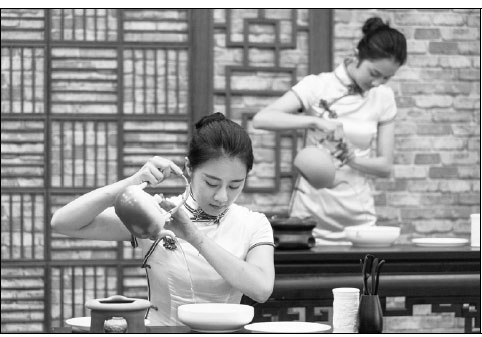County explores new markets for tieguanyin
font-size:
Through the joint effort of the government and companies of Anxi county in Fujian province, the trademark for Anxi Tieguanyin, a premium oolong tea in China, is undergoing a major overseas registration campaign.
Since the beginning of last year, the trademark has been registered in 46 countries and regions, including the United States, Japan, Russia, South Korea and France, to protect the renowned Anxi brand.
Wang Wenli, head of the Anxi Tieguanyin Tea Association, said the tea brand must develop internationally to strengthen its influence.
"Growth in the domestic tea market is slowing down because of the nation's current macro economic situation, so we need to explore new markets," Wang said. "Registering the trademark internationally is a necessary move."
Five member companies in the association formed an alliance at the end of 2012 to establish a sales center for Anxi Tieguanyin in Paris. Over the next three years, the center opened branches in several European countries including Germany and Switzerland.
So far, 65 tea companies in the county have opened subsidiaries, offices or sales centers overseas.
Many of them have also worked out new ways to promote the brand. Xingxi Tea Co launched a partnership with a French chateau to cross-promote their products. Empereur Tea held a tea culture exhibition tour in Europe.
Sanhe Group launched a commemorative tea in 2014 to honor the 50th anniversary of diplomatic ties between France and China.
The group also cooperated with luxury brand Bulgari to make high-end tea gifts.
"It is a good time for international deployment right now," said Wu Rongshan, founder and general manager of Sanhe Group. "The cost of opening an overseas division is low because economies and consumption, for developed regions and emerging economies, are in a downturn."
Wu said tea companies in Anxi should not be content with their domestic success, but have "a higher orientation and global vision".He advised the county's companies to actively take part in global cooperation and competitions to make Anxi Tieguanyin a world-class brand.
The government of Anxi has been supporting the companies' overseas development by issuing policies and guidelines encouraging the acquisition of green food certificates and the opening of divisions abroad.
To promote Chinese tea brands around the world, companies should not only focus on product quality, but the tea culture as well, said Lu Chengyin, a researcher at the Tea Research Institute of the Chinese Academy of Agricultural Sciences.
"The unique skills to make tea represent the crystallization of people's wisdom, a collective intellectual property," Lu said.
Since the beginning of last year, the trademark has been registered in 46 countries and regions, including the United States, Japan, Russia, South Korea and France, to protect the renowned Anxi brand.
Wang Wenli, head of the Anxi Tieguanyin Tea Association, said the tea brand must develop internationally to strengthen its influence.
"Growth in the domestic tea market is slowing down because of the nation's current macro economic situation, so we need to explore new markets," Wang said. "Registering the trademark internationally is a necessary move."
Five member companies in the association formed an alliance at the end of 2012 to establish a sales center for Anxi Tieguanyin in Paris. Over the next three years, the center opened branches in several European countries including Germany and Switzerland.
So far, 65 tea companies in the county have opened subsidiaries, offices or sales centers overseas.
Many of them have also worked out new ways to promote the brand. Xingxi Tea Co launched a partnership with a French chateau to cross-promote their products. Empereur Tea held a tea culture exhibition tour in Europe.
Sanhe Group launched a commemorative tea in 2014 to honor the 50th anniversary of diplomatic ties between France and China.
The group also cooperated with luxury brand Bulgari to make high-end tea gifts.
"It is a good time for international deployment right now," said Wu Rongshan, founder and general manager of Sanhe Group. "The cost of opening an overseas division is low because economies and consumption, for developed regions and emerging economies, are in a downturn."
Wu said tea companies in Anxi should not be content with their domestic success, but have "a higher orientation and global vision".He advised the county's companies to actively take part in global cooperation and competitions to make Anxi Tieguanyin a world-class brand.
The government of Anxi has been supporting the companies' overseas development by issuing policies and guidelines encouraging the acquisition of green food certificates and the opening of divisions abroad.
To promote Chinese tea brands around the world, companies should not only focus on product quality, but the tea culture as well, said Lu Chengyin, a researcher at the Tea Research Institute of the Chinese Academy of Agricultural Sciences.
"The unique skills to make tea represent the crystallization of people's wisdom, a collective intellectual property," Lu said.

Related articles
This article has no related articles!






